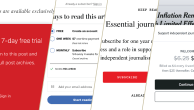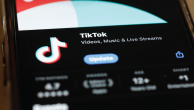Spikes in Attention and Shifts in Conversation
In the four months since the Newtown, Connecticut shootings, the tone of the conversation about gun control on Twitter has shifted sharply several times in apparent response to ongoing events, according to a Pew Research Center analysis of nearly 21 million tweets from December 18 through April 21.

In that period, the Twitter sentiment overall was almost balanced between those supporting stronger gun control measures (42% of the conversation) and those opposed (38%), according to the report. That is in contrast to the first three days after the December 14 attack when an earlier Pew Research report found that pro-gun control voices dominated their opponents 64% to 21%. But what stands out even more is the fluid nature of the debate on Twitter. In 10 of the 18 weeks studied, assertions favoring tougher regulations outnumbered those opposing; in seven of those weeks, the sentiment against a new law was more prominent. In one of those weeks, the mix was exactly even.
The findings also suggest that while pro-gun control forces dominated in the emotional and painful hours immediately following the attack, over time the conversation shifted to reflect the nation’s more divided view of gun control that has become evident in recent years. At the same time, one of the biggest shifts in Twitter opinion occurred the week of the April 17 Senate vote, when sentiment favoring tougher gun laws outstripped expressions of opposition by 3-1.

One key player opposing tighter gun laws-the National Rifle Association-faced more criticism than support on Twitter. In the four months studied, 58% of the assertions related to the NRA expressed opposition to the group compared with 42% that backed the organization.
Overall, the study found that 60% of the Twitter conversation about guns from December 18-April 21 focused on the legislative debate with another 9% focused on the NRA. Straight news accounts of events made up 26% of the conversation.
This examination of the coverage and conversation surrounding the gun debate also found that President Barack Obama was a key newsmaker and driver of the narrative, with spikes in social and mainstream media attention correlating closely with some of his actions and remarks on behalf of tighter gun control. And an analysis of 20 key terms used in the coverage of the gun issue reveals that two of them -“Newtown” and “gun control”-were clearly the most prominent in the media.
These findings are part of a study by the Pew Research Center that examined the coverage and conversation about gun policy from December 10, 2012-April 21, 2013. That included an examination of nearly 21 million relevant Twitter posts, 20 key gun debate-related phrases in 24 major U.S. newspapers and on 2,090 news programs on cable and broadcast television. In addition, Pew Research analyzed public searches for terms related to the gun debate on Google, using Boolean search techniques. (See methodology)
The Twitter Conversation
From the day of the Newtown massacre to the defeat of the legislation, the tone of conversation on Twitter shifted a number of times as one side or the other intensified its social presence. The first major shift occurred quickly after the attack as the outpouring of initial support eroded during the week of December 18-23, when 30% of the conversation called for more gun control and 35% opposed it. After two weeks in which tighter gun law supporters once again outnumbered their opponents, another change occurred. From January 7-20, opposition to new gun laws gained prominence with 49% of the conversation compared with 35% that supported new gun legislation. Two events that perhaps rallied anti-gun control voices in that period were the launch of former Congresswoman Gabrielle Giffords’ gun control campaign on January 8 and President Obama’s release of his gun proposals on January 16.
One such tweet in that period asked Second Amendment supporters to join a “Take Control of Gun Control Week” campaign on Facebook. And the NRA itself was busy tweeting that week, noting in one post that “Since the Federal ‘Assault Weapons’ Ban expired in 2004, murder and overall violent-crime rates have fallen.”
The next major shift in sentiment occurred in early February (4-10), when what had been evenly-split sentiment turned strongly in favor of gun control (47% to 35%). That dynamic lasted until the week of March 11-17, when gun control opponents edged ahead of supporters (44% to 41%). That coincided with a time when the legislative process around a new gun law heated up in the Senate.
After sentiments opposing tougher gun laws outnumbered those of supporters in four of the next five weeks, the pendulum swung yet again. During the week of the April 17 Senate vote (April 15-21), supporters of tougher gun control once again dominated the conversation (65% to 21). That 65%-21% margin almost mirrors exactly the sentiments in the first three days after the tragedy, with 64% of the assertions favoring tougher laws and 21% opposing.
The week of the vote also saw a major spike in the volume of the Twitter conversation, with more than two million relevant posts, roughly double of what it had been each of the previous two weeks.
A number of the most frequently retweeted posts at that time were highly critical of the Senate vote. “There should be a background check before the NRA is allowed to buy a senator,” declared one. “Congratulations, felons! The Senate has upheld your right to buy guns without a background check. Send your donations to @NRA,” read another. A tweet from Obama urged followers to retweet the message, “I am one of the 92% of Americans who support background checks for gun sales.”
While the debate sentiment frequently shifted on Twitter, recent public opinion surveys have found broader public opinion moving away from gun control in recent months. An Associated Press poll released last week found the share of Americans favoring stricter gun laws dropping from 58% to 49% since January. Similarly, a USA Today poll conducted April 18-21 reported 49% of Americans favored a new gun control law while 45% opposed it, a shift from the 61% who supported stricter gun laws back in February. Pew Research will be updating its own trend on this question in the coming weeks, but just reported a related finding that 47% of Americans had a negative view of the Senate’s rejection of new legislation with 39% offering a positive opinion.
Two Terms Dominate the Gun Conversation
One central finding across a number of media outlets is that two terms-“Newtown” and “gun control”-were the most prominent ways the media had of characterizing or discussing the issue.
A Lexis search of 24 newspapers from December 10-April 21 found that “gun control” appeared in 7,245 stories-more than the terms “National Rifle Association” (3,178) “second amendment” (2,047) and “gun rights” (1,421) combined. “Newtown” was second the most frequent term, appearing in 6,175 stories.

In assessing television news coverage on cable and broadcast, Pew Research found that 866 shows out of 2,090 mentioned the term “gun control” barely edging out the term “Newtown,” which appeared on 864 shows. “Gun control” was the leading term on cable news (656 programs out of 1,425) and No. 2 on network broadcast news at 210 shows out of 665. “Newtown” ranked second on cable (605 shows) and first on broadcast at 259.

The Google Trends data reveal the same basic pattern in public searches for key phrases related to the gun debate. “Newtown” represented the most-searched term and was so in every week but one. After that, “gun control” was searched most frequently.
The dominance of these terms highlights the continuing evocation of “Newtown,” the site of the tragedy, as a central catalyst and factor in the ongoing gun control debate. It also suggests that the phrase “gun control,” whether accurately or not, has become a kind of neutral way to reference the ongoing legislative effort in the press narrative and discussion.
Barack Obama as the Central Player
By many different measures, President Obama-who campaigned extensively for tougher gun control laws-was a key driver of the news and conversation on the topic. Overall, Obama’s name was tied to more gun-related search terms than any other individual or Congress in general.
There were several notable spikes in attention that followed a presidential action. One was his December 19 announcement of a Gun Violence Task Force headed by Vice President Joseph Biden. The other was his unveiling of gun control proposals on January 16, which came one day after the NRA released an ad calling him an “elitist hypocrite” because his daughters had Secret Service protection at school.
On Twitter, the biggest week for volume (more than three million relevant posts) was December 18-23, followed by January 14-20 at 2.3 million relevant posts. Obama’s actions on January 16 also corresponded with the biggest week for people searching for the term “gun control” and “Obama gun” on Google. More broadly, the term “Obama gun” was searched almost twice as frequently on Google as the terms “gun Congress” and “gun bill” over the four months studied.

In newspaper stories, these two weeks also showed spikes in volume, according to our search term analysis. The term “gun control” appeared in 861 stories, the week of December 17-23, a high water mark. After that came 741 mentions of that term from January 14-20. The term “gun control” also appeared in the most television news programs the week of December 17-23 (90).
Over the four months studied, only two terms, “gun control” (7,245) and “Newtown” (6,175) appeared in more newspaper stories that included the words “Obama” and “gun” (4,592).
And in all the television news analyzed over four months, “Obama” and “gun” were found to be mentioned in close proximity on more programs (623) than any of the gun related terms other than “Newtown” (864) and “gun control” (866). The National Rifle Association trailed close behind, at 601 programs.





